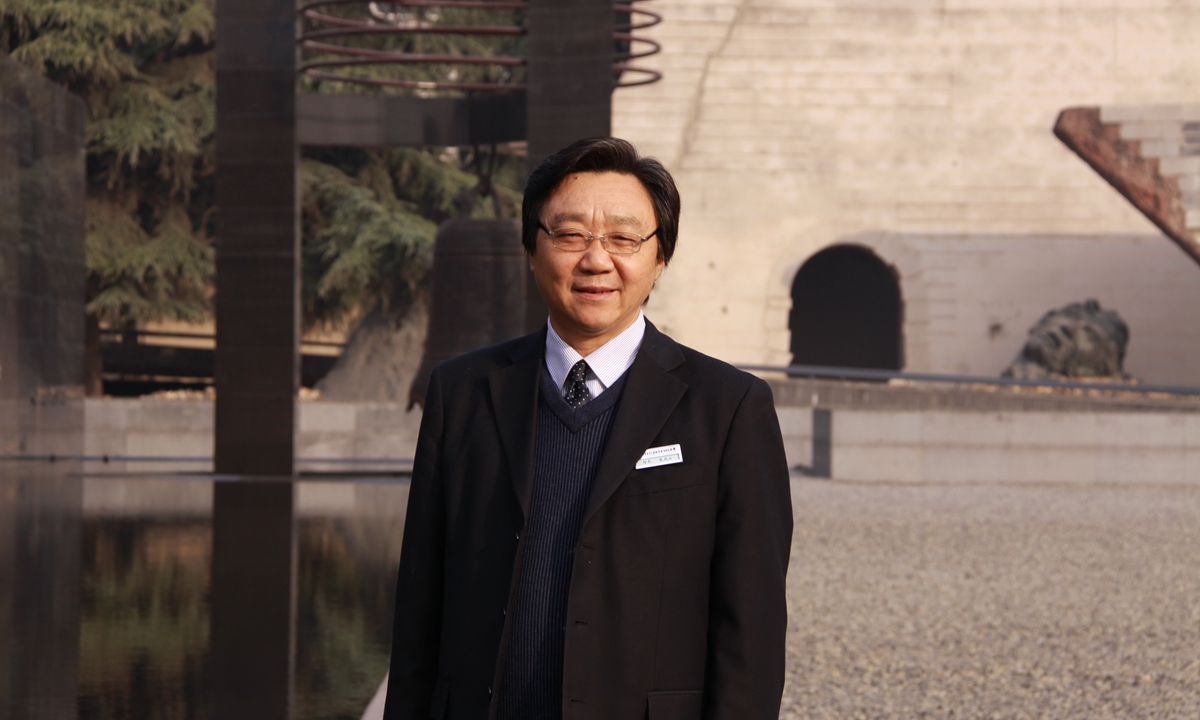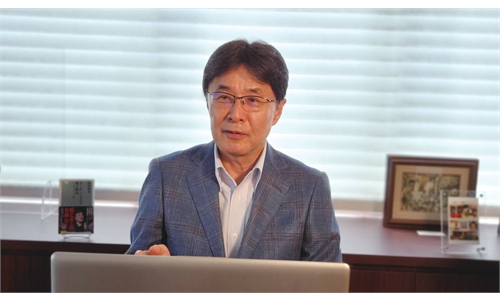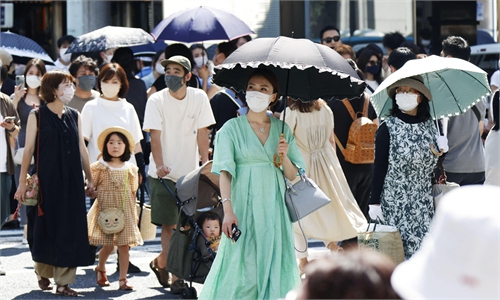Japan, which committed 'one of the most representative fascist atrocities,' must reflect rather than seeking military rise through NATO, says former curator of the Nanjing Massacre Memorial Hall

Zhu Chengshan Photo: Courtesy of Zhu
Japan's frequent interactions with NATO and blatant participation in the US-led military alliance have undermined peace and stability in the Asia-Pacific region, causing particular concern, said Zhu Chengshan, former curator of the Memorial Hall of the Victims in Nanjing Massacre by Japanese Invaders, on Wednesday.
On the same day, Fumio Kishida will become the first Japanese prime minister to attend the NATO summit in Madrid, Spain, which is expected to collude with NATO members, Australia, New Zealand and South Korea to counter China. Japan's advocacy of an "Asian NATO" or "global NATO" is widely considered to go against the times and could lead to a new cold war or even a hot war.
"As a member of Asia, why does Japan insist on bringing trouble to the East? Why is Japan intent on returning to the old path of militarism? Why does it undermine the hard-won peace and stability in East Asia? This is the question for all who do not wish to see history repeat itself," Zhu asked.
The lessons of the 20th century show that war is the biggest "man-made disaster" and that aggression, expansion and plunder are the sources of it, the former curator said, noting that "Today, in the 21st century, peaceful development has become the theme of the world while the 'Greater East Asia War' advocated by Hideki Tojo and other Japanese militarists has long been swept to the dustbin of history."
"Why do Japanese militarists still linger on? Why is there always someone in Japan obsessed with war and violence? Why is there always someone in Japan who is out of step with the world trend toward peace?" Zhu continued to ask.
Japan should draw lessons from history, bid farewell to militarism, condemn aggression and expansion, live in peace and friendship with other Asian countries and jointly build, maintain and develop a peaceful and tranquil environment in Asia, Zhu urged.
"History often reappears and exists in amazing ways," Zhu warned.
In September 1940, Japan, Germany and Italy signed a Tripartite Pact, which promoted Eurasia to become the birthplace of WWII. The treaty notably called on the signees "to assist one another with all political, economic and military means" when any one of them was attacked by a power at present not involved in the European War or in the "Sino-Japanese Conflict."
Zhu pointed out that this period of history is a mirror, but also a sobering medicine. The Japanese militarists at that time followed the external expansion policy of "leaving Asia for Europe" and "establishing a Greater East Asia Co-Prosperity Sphere," and gradually went astray toward the war of aggression, Zhu said.
Now, Japan has frequent interactions, flirting with NATO and its blatant participation in the US-led military alliance has undermined peace and stability in the Asia-Pacific region, raising concerns among Asian people, Zhu said.
The so-called Indo-Pacific Strategy is part of a major transformation unseen in the world in a century, which is characterized by the US' efforts to promote its world hegemony through coercion and sanctions, Zhu said.
"It is worth noting that Japan's right-wing forces have long been bitter about its defeat in WWII, hoping one day they can break the constraints of the Peace Constitution, and attempt to become a 'normal country' both politically and militarily," Zhu said.
At present, the Japanese government is keen to take a ride on the US-led Indo-Pacific Strategy, expanding its military presence, breaking through the limitation of "self-defense" and acting as a "follower" of the US, which is a very dangerous signal, Zhu warned.
It is an indisputable fact that "the seed of militarism" still exists in Japan, and we must be on guard against the resurgence of Japanese militarism, Zhu told the Global Times in an exclusive interview.
"The Japanese government's miseducation of distorting historical facts over the years is an important reason for this phenomenon," he pointed out.
After the war, the Japanese government has always taken a veiled and ambiguous attitude toward its history of aggression. Japanese textbooks have always avoided the real history education, tampering with the "invasion" of China as "entry," glamorizing the "brutal conquest" of Asia as the "liberation" of the continent. Also, the Nanjing Massacre, in which more than 300,000 people were killed, has been described as "fiction" while forcing Chinese women to work as sex slaves is explained as a "commercial practice," said the former curator.
Zhu said that Japan's history education is more and more deviated from facts, which has caused many Japanese to have a woefully inadequate understanding of their history of aggression, thus many Japanese are confused about who was the perpetrator and who was the victim in WWII.
Also, in recent years, Japan has gone even crazier to hype the "China threat" theory, in an attempt to wipe its history of aggression clean and throw dirty water at China at the same time, said Zhu. "This despicable trick is shameful," he condemned.
Japan's aggression and victimizing of Asian countries, especially China, during WWII has left a tragic page in the history of mankind and the suffering of the Chinese nation. The Nanjing Massacre was one of the most concentrated and representative cases of fascist atrocities committed by Japanese militarists in WWII, and was as devastating a tragedy as the massacre of Jews at the Auschwitz concentration camp, standing as a blood proof of the barbarism that killed humanity and damaged civilization, Zhu accused.
"There is overwhelming evidence of the Nanjing Massacre, leaving behind a large number of human and physical evidence, including more than 4,000 testimonies by survivors of the tragedy. More than 60 survivors of the Nanjing Massacre are still alive today. They are victims and witnesses of this period of history," Zhu said.
"An important task facing us is to inform more Japanese and people around the world about the historical facts of the Nanjing Massacre in an in-depth and lasting way," Zhu stressed.
"Japanese militarism has inflicted untold damage on Asian countries. In the course of my international peace work, I have shared the process with victims from other Asian countries to complain about the atrocities of the Japanese army during WWII," Zhu said. The victims from other Asian countries said that although their nationalities were different, they were all persecuted by the Japanese army, according to Zhu.
Japan must face up to and reflect on its own historical crimes and should not seek military rise by tying up NATO. The people of China and the rest of Asia who suffered at the hands of the Japanese army in WWII and other peace-loving people in the world do not want to see the tragedy of history repeat itself, Zhu said.



